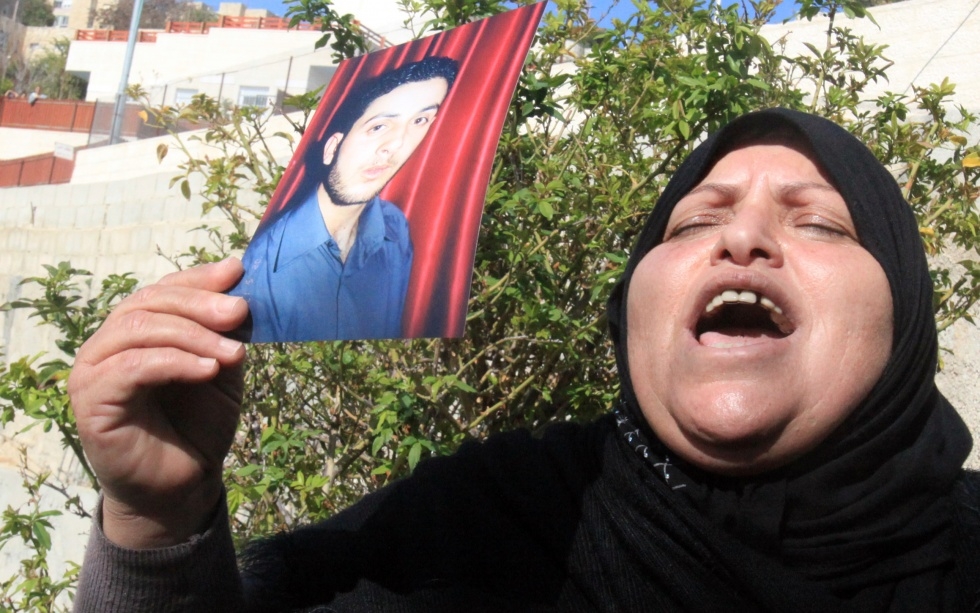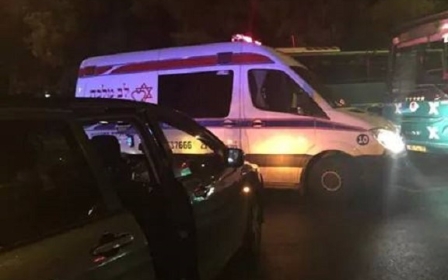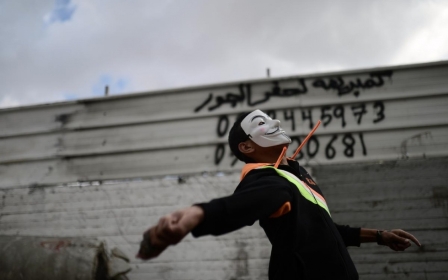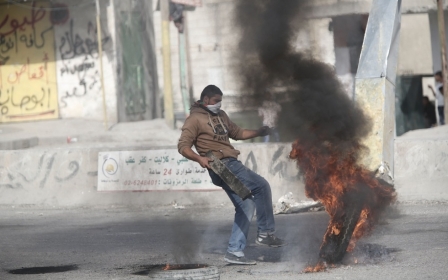Synagogue attack seen as 'reaction' to ongoing Israeli occupation

JERUSALEM - In the haze of this morning’s attack at a synagogue in Jerusalem, the Jerusalem public watched with horror as evidence emerged from the scene. Bodies under prayer blankets, floors slick with red and bloodied meat cleavers were what remained at the end of the dawn massacre that left four Israelis dead, as well as their Palestinian attackers.
The response from Israeli authorities was similar to those of previous attacks on Jewish Jerusalemites, if starker in tone. Just hours after the attack, Prime Minister Benjamin Netanyahu vowed to “respond decisively” to the “horrific murder of Jews who came to pray and were killed by despicable murderers”. He echoed other Israeli leaders in placing the blame for the attacks squarely on the head of Palestinian President Mahmoud Abbas.
For the Palestinians living in East Jerusalem, the rhetoric and the reality of this uncompromising response are familiar, and protest immediately erupted on the streets. In neighbourhoods across the occupied city, including checkpoints like Qalandia and areas like Al Ram located behind the wall, clashes have been ongoing since Tuesday morning. Israeli forces reportedly fired tear gas, stun grenades and rubber bullets in response to protesters’ stones, and checkpoints leading into Jerusalem and even internal West Bank roads were closed entirely.
The two East Jerusalemites who carried out the attack were Ghassan Abu Jamal, 30, and Oday Abu Jamal, 23, cousins from the neighbourhood of Jabal al-Mukaber in the south east of the city. In their neighbourhood this morning, heavy clashes began soon after the news emerged. Eight members of the mens’ family were arrested in the course of the police response, and by midday several hundred people had gathered in front of the family’s home, along with a strong police presence and heavy use of tear gas across all areas of the neighbourhood.
Among many Palestinians, the dawn attack has quickly been billed as a response to ongoing Israeli occupation. Most locals say that Jerusalem has been in the grip of a third Intifada for months, a gradual uprising characterised by weekly clashes, police crackdowns, housing demolitions and the arrest of hundreds of Palestinians and attacks on Israelis. Recent right-wing moves to control the Al-Aqsa Mosque compound, and the death of 16-year-old Mohammed Abu Khdeir at the hands of extremist Israelis this summer, have steadily inflamed an already explosive situation.
“Netanyahu has to step back from Jerusalem and al-Aqsa, and from the people that live in Jerusalem. That’s the solution. This is the feeling of every Muslim and Jerusalemite,” Daoud Abu Jamal, a cousin of Ghassan and Oday, told Middle East Eye in Jabal al-Mukaber on Tuesday morning. “Someone has to stop Netanyahu, and stop the people that are killing Palestinians.”
Ghassan and Oday, Daoud said, were young men thinking about their future, but found themselves trapped by occupation in Jerusalem. The cousins had seen men close to them imprisoned for long periods of time, and came from a context of high poverty, unemployment and underepresentation. Of 300,200 Palestinian residents of East Jerusalem, 238,000 live below the poverty line, and the average monthly income for the group is about 60 percent of Israeli Jews living in the city.
The cousins responsible for the attack reportedly worked at a grocery shop opposite the synagogue, numbering them among the many Palestinians who, starved of employment and opportunities in East Jerusalem, work for Israeli businesses in the West of the city.
“They push the people, demolishing the houses, moving into al-Aqsa Mosque, buying houses in Silwan,” Ahmed Ruwidi, an adovcate from East Jerusalem, told MEE. “Every day, there’s more checkpoints, more problems with police. Daily life in Jerusalem is very hard, there are more than 20,000 homes in Jerusalem that are illegal, and can be demolished at any time.
“Every day when our children go to school there are more checkpoints, in Silwan, Ras el Amud, Shuafat. This puts something in the hearts of the children here. It makes life miserable.
“All these things push people to defend themselves,” he continued. “No-one here is behind today’s attack. But Netanyahu is responsible for all the things happening in this area. And we hold Netanyahu responsible here.”
The disparity and political pressure ends up pushing many to the brink.
Days before the bloody synagogue attacks, the city was seething with discontent when the controversial death of a Palestinian Bus Driver seemingly accelerated developments.
On Sunday 16 November, the body of 32-year-old Yusuf al-Ramouni was discovered hanging in the Israeli-owned Egged bus he drove for a living.
Israeli authorities were quick to label the death a suicide but almost all Palestinians believe al-Ramouni was murdered by extremist settlers – a conviction built on inadequacies in the official report on his death and the context of persecution, marginalisation and deep fear felt by East Jerusalemites, and particularly those working for Israeli employers.
Nadeem, a driver in his early forties who worked with Nadeem at Egged told MEE that Palestinian drivers are often hit by passengers and threatened and that the word “Arab” was frequently used as a derogatory term against them.
“The Jewish Israelis, they hate us,” said Nadeem, who did not want to give his last name for fear of getting into trouble with his employers. “If they know that a driver is Arab, then they are going to start making it harder for them. They always curse us, and there is a great tension between us, and this is only increasing. The attacks and the abuse are increasing. Their hatred against Arabs is growing every single day. It’s impossible to live with them and to deal with them anymore.”
Its hostile conditions like these that workers like Nadeem say pushed them to stage a two-day nation-wide strike in Israel in the wake of Ramouni’s death.
“Recently they were trying to force open the door to get in the bus, they were going to beat me,” said 50-year-old Bassem who also works for Egged busses.
“Sometimes if the drivers are working in the night, their wives and children never know for sure if we will come back or not,” Bassem continued. “In the past, the company has called me and said 'if you are not coming to work we are going to fire you.’
“I would reply that 'I am ready to lose my job but I am not ready to lose my life.' I am going to work. I’m not going to kill someone, or be killed by someone.”
At WAC-ma'an, a joint Jewish-Arab trade union in East Jerusalem, activist Yoav Tamir said that years of double standards had taught workers to hold little faith in Israeli justice.
"We are talking about a population here that doesn't feel represented in any way. There's no chance of a fair trial," he said.
"If it turned out that a Palestinian man killed a Jewish driver, then houses would be being demolished right now. So the assumption is that it's a murder partly because, if it was, no-one would care."
Speaking to Middle East Eye less than 12 hours before Tuesday’s attack, Tamir’s comments now echo an eerie warning.
"Look at [East Jerusalem neighbourhoods] like Shuafat, Kufr Aqab: you have essentially a slum, to all intents and purposes, people feeling like they’re second class citizen with nothing to live for.
“To be honest, I’m surprised people don’t react with extreme violence more often,” Tamir added.
New MEE newsletter: Jerusalem Dispatch
Sign up to get the latest insights and analysis on Israel-Palestine, alongside Turkey Unpacked and other MEE newsletters
Middle East Eye delivers independent and unrivalled coverage and analysis of the Middle East, North Africa and beyond. To learn more about republishing this content and the associated fees, please fill out this form. More about MEE can be found here.




